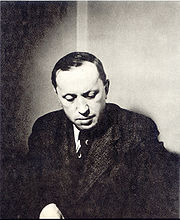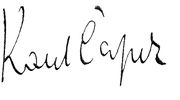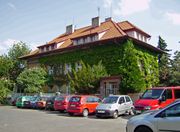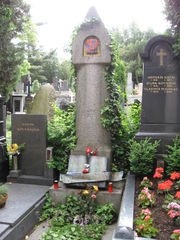Karel Čapek
| Karel Čapek | |
|---|---|
 |
|
| Born | January 9, 1890 |
| Died | December 25, 1938 |
| Occupation | writer |
| Spouse | Olga Scheinpflugová |
| Signature | |
 |
|
Karel Čapek (Czech pronunciation: [ˈkarɛl ˈtʃapɛk] (![]() listen)) (January 9, 1890 – December 25, 1938) was one of the most influential Czech writers of the 20th century.
listen)) (January 9, 1890 – December 25, 1938) was one of the most influential Czech writers of the 20th century.
Contents |
Life and work
Čapek was born in Malé Svatoňovice, Bohemia, Austria-Hungary (now Czech Republic).
He wrote with intelligence and humour on a wide variety of subjects. His works are known for their interesting and precise descriptions of reality, and Čapek is renowned for his excellent work with the Czech language. He is perhaps best known as a science fiction author, who wrote before science fiction became widely recognized as a separate genre. He can be considered one of the founders of classical, non-hardcore European science fiction, a type which focuses on possible future (or alternative) social and human evolution on Earth, rather than technically advanced stories of space travel. However, it is best to classify him with Aldous Huxley and George Orwell as a speculative fiction writer, distinguishing his work from genre-specific hard science fiction.

Many of his works discuss ethical and other aspects of revolutionary inventions and processes that were already anticipated in the first half of 20th century. These include mass production, atomic weapons, and post-human intelligent beings such as robots or intelligent salamanders.
In addressing these themes, Čapek was also expressing fear of impending social disasters, dictatorship, violence, and the unlimited power of corporations, as well as trying to find some hope for human beings. Čapek's literary heirs include Ray Bradbury, Salman Rushdie, Brian Aldiss and Dan Simmons.
His other books and plays include detective stories, novels, fairy tales and theatre plays, and even a book on gardening. His most important works attempt to resolve problems of epistemology, to answer the question: "What is knowledge?" Examples include "The Tales from Two Pockets", and first book of all the trilogy of novels Hordubal, Meteor, and An Ordinary Life.

Later, in the 1930s, Čapek's work focused on the threat of brutal Nazi and fascist dictatorships. His most productive years coincided with the existence of the first republic of Czechoslovakia (1918–1938). He wrote Talks with T. G. Masaryk[1] – Masaryk was a Czech patriot, the first President of Czechoslovakia, and a regular guest at Čapek's Friday garden parties for Czech patriots. Čapek was also a member of Masaryk's Hrad political network. This extraordinary relationship between the author and the political leader may be unique, and was an inspiration for Václav Havel. He also became a member of International PEN.
Soon after it became clear that the Western allies had refused to help defend Czechoslovakia against Hitler, Čapek refused to leave his country – despite the fact that the Gestapo had named him Czechoslovakia's "public enemy number 2." Though he suffered all his life from the condition Spondyloarthritis, Karel Čapek died of double pneumonia on December 25, 1938, shortly after part of Bohemia was annexed by Nazi Germany following the so-called Munich Agreement. He was interred in the Vyšehrad cemetery in Prague. His brother Josef Čapek, a painter and writer, died in Bergen-Belsen concentration camp.
After the war, Čapek's work was only reluctantly accepted by the Communist government of Czechoslovakia, because during his life he had refused to accept communism as a viable alternative.[2]
Etymology of robot
The word robot comes from the word robota meaning literally serf labor, and, figuratively, "drudgery" or "hard work" in Czech, Slovak and Polish. The origin of the word is the Old Church Slavonic rabota "servitude" ("work" in contemporary Russian), which in turn comes from the Indo-European root *orbh-. Robot is cognate with the German word Arbeiter (worker).
Karel Čapek introduced and made popular the frequently used international word robot, which first appeared in his play R.U.R. (Rossum's Universal Robots) in 1921. While it is frequently thought that he was the originator of the word, he wrote a short letter in reference to an article in the Oxford English Dictionary etymology in which he named his brother, painter and writer Josef Čapek, as its actual inventor.[3] In an article in the Czech journal Lidové noviny in 1933, he also explained that he had originally wanted to call the creatures laboři (from Latin labor, work). However, he did not like the word, seeing it as too artificial, and sought advice from his brother Josef, who suggested "roboti" (robots in English).
An outline of Čapek's works
Works which can be considered early science fiction
- 1920 - R.U.R. (Rossum's Universal Robots) (Rossumovi univerzální roboti) - one of the first usages of artificial human-like beings in art and literature and are manufactured by biotechnology not mechanics.
- 1922 - The Makropulos Affair (Věc Makropulos) - discussion about human immortality, not really from a science-fiction point of view
- 1922 - The Absolute at Large (Továrna na absolutno) - can be interpreted as vision of consumer society
- 1922 - Krakatit - plot includes prediction of nuclear-weapon-like explosive
- 1936 - War with the Newts (Válka s mloky) - dystopian satire
Anti-Nazi plays from the 1930s
- 1937 - The White Disease (Bílá nemoc) - earlier translated as Power and Glory
- 1938 - The Mother (Matka)
Other works
- Stories from a Pocket and Stories from Another Pocket (Povídky z jedné a z druhé kapsy) — a common name for a cycle of short detective stories (5–10 pages long) that shared common attitude and characters, including The Last Judgement.
- How it is Made — satiric novels on the life of theatre, newspaper and film studio.
- The Gardener's Year (Zahradníkův rok, 1929) is exactly what it says it is: a year-round guide to gardening, charmingly written, with illustrations by his brother Josef Čapek.[4]
- Pictures from the Insects' Life (Ze života hmyzu), also known as Insect Play, with Josef Čapek, a satire in which insects stand in for various human characteristics: the flighty, vain butterfly, the obsequious, self serving dung beetle.
- Apocryphal Tales (Kniha apokryfů, 1932, 2nd edition 1945),[5] short stories about literary and historical characters, such as Hamlet, a struggling playwright, Pontius Pilate, Don Juan, Alexander arguing with his teacher Aristotle, and Sarah and Abraham attempting to name ten good people so Sodom can be saved: E.g. "What do you have against Namuel? He's stupid but he's pious."
- Nine Fairy Tales: And One More Thrown in for Good Measure (Devatero Pohádek a ještě jedna od Josefa Čapka jako přívažek, 1932)
- Dashenka, or the Life of a Puppy (Dášenka čili Život štěněte, 1933)[6]
Travel books
- Letters from Italy (Italské listy, 1923)[7]
- Letters from England (Anglické listy, 1924)[8]
- Letters from Spain (Výlet do Španěl, 1930)[9]
- Letters from Holland (Obrázky z Holandska, 1932)[10]
- Travels in the North (Cesta na Sever, 1936)[11]
Selected bibliography
- The Absolute at Large, 1922 (in Czech), 1927, The Macmillan Company, New York, translator uncredited. Also published June 1975, Garland Publishing ISBN 0-8240-1403-0,
- Apocryphal Tales, 1945 (in Czech), May 1997, Catbird Press Paperback ISBN 0-945774-34-6, Translated by Norma Comrada
- An Atomic Phantasy: Krakatit or simply Krakatit, 1924 (in Czech)
- Nine Fairy Tales: And One More Thrown in for Good Measure, October 1996, Northwestern Univ Press Paperback Reissue Edition, ISBN 0-8101-1464-X. Illustrated by Josef Capek, Translated by Dagmar Herrmann
- R.U.R, March 1970, Pocket Books ISBN 0-671-46605-4
- Tales from Two Pockets
- Short story collection, Mystery (nsf) Translated by Norma Comrada June 194, Catbird Press Paperback ISBN 0-945774-25-7
- Talks With T.G. Masaryk Non-fiction. Biography of T.G. Masaryk, founder of Czechoslovakia.
- Three Novels: Hordubal, Meteor, An Ordinary Lives NSF? Translated by M. and R. Weatherall
- Toward the Radical Center: A Karel Capek Reader. Collection of stories, plays and columns. Edited by Peter Kussi, Catbird Press ISBN 0-945774-07-9
- War with the Newts 1936 (in Czech), May 1967, Berkley Medallion Edition Paperback. Translated by M. & R. Weatherall, March 1990, Catbird Press paperback, ISBN 0-945774-10-9, October 1996, Northwestern University Press paperback ISBN 0-8101-1468-2
Čapek in popular culture
- On the science fiction cartoon show Futurama (season 1, episode 5 - "Fear of a Bot Planet"), a planet inhabited entirely by robots was named "Chapek 9", as a reference to Karel Čapek's coining of the term "robot".
- In the Star Trek episode "Requiem for Methuselah", the android Rayna Kapec was named in honor of Čapek.
- A recurring character in the cartoon show Batman: The Animated Series was named Karl Rossum. He was an inventor that specialized in robots.
- The story "Big Robots" in Judge Dredd Megazine (#257 - ?) features a Mega City One tower block named "Karel Čapek" which turned out to be a giant robot.
- At least two computer programming languages were named for Čapek:
- KAREL is the programming language for FANUC robots.
- Karel is a teaching tool, intended to introduce programming to beginners; students instruct a robot (also named Karel) how to perform various tasks.
- In the computer game Red Faction there is a character named Dr. Capek, who is involved in experiments with nanotechnology.
- The Japanese H-game R.U.R.U.R. uses "Čapek" as a term for a specific type of robot: biological machines made from flesh mixed in a vat with nanomachines.
- There is a Dr Capek in Heinlein's DOUBLE STAR.
- On the TV show Dollhouse, the parent corporation is named Rossum.
- In the video game Mass Effect 2, one mission requires the player to shut down a factory which produces defective robots on a planet called Capek.
See also
- Czech science fiction and fantasy
Notes
- ↑ Talks with T. G. Masaryk at Google Books
- ↑ K. Čapek, Why I am not a Communist?, Přítomnost 4 December 1924.
- ↑ Karel Capek - Who did actually invent the word "robot" and what does it mean? at capek.misto.cz
- ↑ The Gardener's Year at Google Books
- ↑ Apocryphal Tales at Google Books
- ↑ Dashenka, or the Life of a Puppy at Google Books
- ↑ Letters from Italy at Google Books
- ↑ Letters from England at Google Books
- ↑ Letters from Spain at Google Books
- ↑ Letters from Holland at Google Books
- ↑ Travels in the North at Google Books
External links
- Overview
- A comprehensive website on Čapek
- Karel Čapek, 1890--1938 - brief biography, with information about the writer's plays and novels
- Further links
- Karel Čapek page at Catbird Press, a publisher of several Čapek translations
- Works by Karel Capek at Project Gutenberg
- RUR and War with the Newts in English translation
- Čapek in English translation by David Wyllie
- The monument of Karel Čapek
- Čapek, Karel: Válka s Mloky Czech version, online book
- Karel Čapek entry at the Literary Encyclopedia
- (Czech) Complete work of Karel Capek is available in fulltext on the web sites of Municipal library in Prague